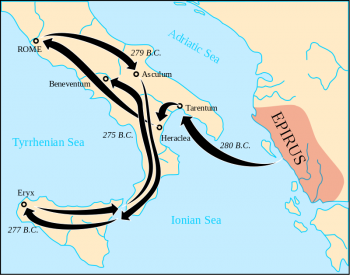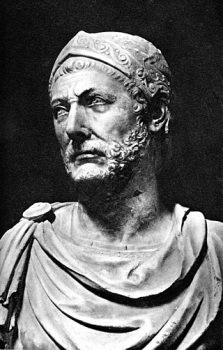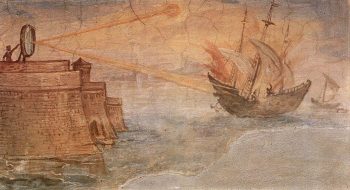Major Wars in the Early Roman Republic Posted by andregurgel on Apr 10, 2019 in Intro to Latin Course, Roman culture
Note: This blog post is a companion to Unit VI of our Introduction to Latin Vocabulary course. You can learn more about the course here.
Over thousands of years mankind has witnessed the rise and fall of many empires, among which the Roman Empire was one of the largest in recorded history.
Some other empires were even larger than the Roman, such as the Mongolian empire which however lasted less than two hundred years. In contrast, the Roman empire lasted two thousand years! You think I’ve got the mathematics wrong, don’t you? Well, the barbarians did invade the empire but the Eastern Roman Empire, also known as Byzantium, lasted for another millennium!
An empire is built in two ways: by diplomacy and by war. In some cases, kings realized that an alliance with Rome might come in handy, so their kingdoms became Roman provinces. In other cases, they resisted Roman occupation which inevitably led to war. Rome took their lands by force and turned them into slaves. That’s the sad history of mankind! In this post, you will read about some of the main wars that took place during the Roman Republic.
Historical Background: the Rise of the Republic
During the early days of Rome, the eternal city was nothing but a small town which was always having trouble with its neighbors. If the tale of Viergil and other writers is accurate, the Romans were descendants of people from Asia Minor (modern-day Turkey) who came to the Italian Peninsula. Viergil even claimed that the Romans were Trojans who managed to escape after the Greeks took the city and that emperor Augustus’ family, the gens Iulia, was descended from the Trojan hero Aeneas and the goddess Venus herself. That was, of course, a nice trick to justify Augustus’ rule. As you can see, political propaganda dates back to Antiquity!
Rome was ruled by a king. We don’t know much about the Roman regal period, as the records from that time were burned by the Gauls when the chieftain Brennus sacked the city in the 4th century BCE. Therefore, whatever we know about the kings is mostly based on secondary sources, but we do know that Rome had seven kings.
The last king of Rome was called Tarquinius Superbus. His son violated a noblewoman named Lucretia who later committed suicide out of shame. This event caused great unrest among the Roman people who, led by Brutus, expelled Tarquinius after a bloody civil war. Following years of fighting, Rome became a republic ruled by a senate.
The Conquest of Italy
You have probably heard that “Rome wasn’t built in a day” and that’s certainly true. In fact, Rome started as a small kingdom, far from being a great empire. Before starting its expansion, it was surrounded by other peoples such as the Etruscans, Samnites, Umbrians, etc. There was constant war with those peoples who probably saw the Romans as nothing but invaders, but Rome also used diplomacy and made alliances with them.
After the establishment of the Roman Republic, Rome would face a long period of war with its neighbors until it became the mistress of all Italy. Some peoples like the Sabines were previously allies of the Romans. Romulus had even allowed their King Titus Tatius to co-rule Rome. On the other hand, that equal treatment was over when the last king was exiled. The Romans started a long campaign of conquest extending their dominion from the river Tiber to the shores of the Italian peninsula. That happened mostly following a war against the Etruscan states to the north which were annexed in the fifth century B.C. and the Samnites and Greek colonies to the south were conquered in the fourth and third century B.C. However, as we have said before, we can’t be sure about the authenticity of any of these dates.
The Pyrrhic War
Pyrrhus was a Greek general and a fearsome adversary of Rome. He was a second cousin of Alexander the Great, hence his prowess in battle. Pyrrhus was king of Epirus, an ancient Greek state located in the geographical region of Epirus in the western Balkans. The war with the Romans started when the Greek city of Tarentum asked for Pyrrhus’ aid against the Romans. At first, Pyrrhus was successful thanks to the use of elephants in the battlefield. It was the first time the Romans faced elephants in battle. The Romans had never seen elephants before and probably thought those enormous beasts were monsters!
King Pyrrhus was enjoying his success but he was losing so many soldiers after each victory that it didn’t feel like a victory at all. According to the historian Orosius, Pyrrhus said after the Battle of Asculum Ne ego si iterum eodem modo uicero, sine ullo milite Epirum reuertar (if I continue winning like this, I will go back to Epirus without a single soldier). That’s the origin of the idiom Pyrrhic Victory, which is still used today! Realizing that he couldn’t win the war against the Romans, Pyrrhus retreated. The Romans weren’t able to beat this descendant of Alexander the Great.However, years later they not only conquered former Greek colonies in southern Italy and Sicily, but all of the Greek peninsula itself by 146 BC.
Punic Wars
If we could go back to the days of the Roman Republic and attend a public speech by Cato the Elder, we would hear him begin with the famous quote Carthago delenda est! (Carthage must be destroyed!). why didt the well-known orator start all his speeches like that? Because Carthage was a real threat to the Romans!
When Carthage was founded by the Phoenicians, (who were known for their prowess in commerce) it was small and unpretentious, but the city soon grew and became an empire with colonies in Spain, Italy, and North Africa.
There were three Punic Wars which lasted for over a hundred years. The Romans were known for their great strategists but the enemy also had brilliant commanders. The Romans thought the Alps would be a natural defense for their homeland so they didn’t expect the Carthaginian general Hannibal to find a way to cross the Alps and, to make things worse, with war elephants! For fifteen years, Hannibal plundered Roman territories until he was defeated by the Roman general Scipio Africanus at the Battle of Zama.
Many years after Hannibal’s defeat, the Romans finally took Carthage and slaughtered its population. However, there is a common myth that the Romans’ hatred towards Carthage was such that they threw salt on the conquered territory in order to make it sterile. That’s not true as Rome was in need of more land and Roman soldiers and farmers soon settled in Carthage.
The Siege of Syracuse
Another important war during the early republic was the siege of Syracuse. Syracuse was an independent kingdom and a historical ally of Carthage. The Romans were afraid that the Syracusans would aid Carthage in the Second Punic War, so they besieged the city. At first, it sounded like the Romans wouldn’t have much trouble defeating the kingdom of Syracuse. They had already conquered the entire Italian Peninsula and had already faced Hannibal’s elephants. However, they didn’t realize that the Carthaginians had a man who was worth thousands of soldiers: Archimedes.
Archimedes was one of the greatest geniuses of mankind who used his intellect to defend his homeland against the Romans invaders. We know for a fact that he created a device which became known as Archimedes’ Claw. The device resembled a modern-day construction crane with a large metal grappling hook. When the claw was dropped onto a ship, the arm would swing and lift the ship out of the water. Another brilliant device was a special parabolic mirror which used the sun’s beams to set fire to enemy ships.
The Romans eventually took the city. The population was attending a celebration in honor of the goddess Artemis when a small party of Roman soldiers came during the night, scaled the city walls and opened the city’s gates. The Roman commander ordered that Archimedes was not to be harmed, but the legionary who was supposed to escort the inventor ignored his orders and killed him. No one knows for sure why.
It took only a second to deal Archimedes a deadly blow. But it would take over a thousand years before another mind like his would be born.
Rome’s power would grow even stronger after the Republic and the rise of the empire. However, is having an empire a good idea? As you have seen in this article, many lives were lost so that Rome could build a huge empire. History shows us that all empires eventually fall. See the fall of the Berlin Wall and the end of the Soviet Union, for example. Should mankind perhaps give up the idea of empire building? I certainly think so!
Glossary of Latin Terms
Carthago delenda est! Carthage must be destroyed!
Ne ego si iterum eodem modo uicero, sine ullo milite Epirum reuertar –if I continue winning like this, I will go back to Epirus without a single soldier.
References
Plutarch. lives. Loeb Classical Library;
Tacitus. Annals. Loeb Classical Library
Eutropius. Breviarium ab Urbe Condita. Published by Pravana Books

Build vocabulary, practice pronunciation, and more with Transparent Language Online. Available anytime, anywhere, on any device.







